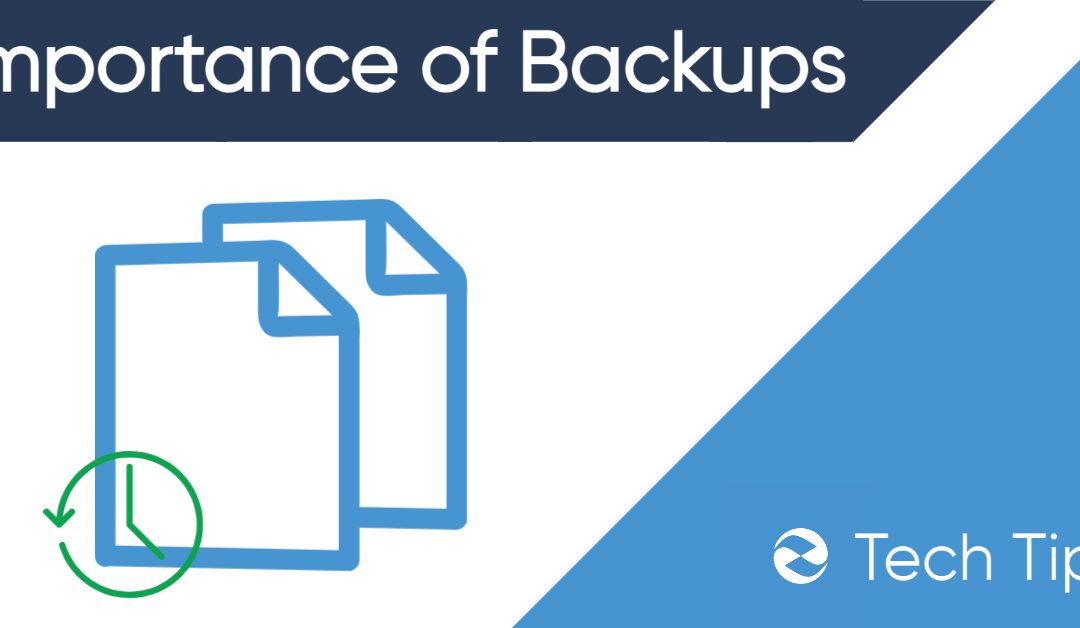Never get caught without Backups! Data loss is one of the most costly and destructive accidents that can happen to a business. Most businesses are online and even the local flower shop could be handling a massive quantity of data via payment portal, accounting software, or employee scheduling tools. Imagine what would happen to the flower shop if they lost or leaked their client’s payment information, lost their YoY sales data, or no longer had employee schedules. The business would likely never recover the trust of clients, employees might not be paid correctly leading to turnover, and the shop might even get audited by the IRS.
Research states that in the event of mass data loss most businesses will ultimately fail. This happens because of lost customer trust, legal liabilities, and financial burden tied to lost sales or trying to recover data.
Pepperdine University published a peer-reviewed paper demonstrating the financial impact to businesses that suffer from data loss. According to the paper published back in 2003, the annual cost of lost data was $18.2 billion, a figure that has likely grown exponentially due to the increased importance of data. They also mention that a total data loss can cost businesses North of $20,000.
You can’t ever predict data loss. There are no red flags that point to it. Hard drives could fail, a virus could be unleashed that compromises data, or an employee could accidentally wipe the system. The only think you can do is prepare backups.
Reasons to Keep Backups
There are reasons other than disaster recovery to keep backups. Backups save businesses time, money, and effort. Here are the broad advantages of keeping consistent backups.
Save from Irreparable Business Damage: Let’s face it. Today your business is extremely likely to fail in the event of complete data loss. Between irreparable trust from clients and partners to lost sales in the aftermath, recovery is nearly impossible. With proper data backups your business will be able to restore systems and minimize trust damage.
Convenience: Even if data isn’t necessarily lost, having backups can be convenient. For example, let’s say that you accidentally deleted the employee schedule on your hosted app. Wouldn’t you want a way to recover it? By keeping consistent backups like ZebraHost does with 2 week retention, that schedule you made can be recovered.
Peace of Mind: If you know your data is safe, you can spend less time worrying about the potential disaster data loss can wreak.
Save Time: In the event of data loss, which for many businesses is inevitable to some degree, you will spend less time working on restoring lost data. And even if you’re data isn’t lost but instead simply needs to be moved or replicated, simply copy over a backup.
Now Here’s Some Specifics Scenarios Backups Come in Handy
Copy a Machine: If you work in IT or are a developer, the ability to simply copy machines can save hours of work. Instead of installing dependencies, a database, programs, and all the data on another machine to test something, you can simply copy a machine then either use it in tandem with another machine or delete either machine if it is no longer needed.
Restore Customer Payment: A very real human or machine error that can happen is that transaction data or payment information is wiped. While you can spend hours calling clients and checking receipts to restore everything manually, a backup can restore all this data in a matter of seconds.
Revert to an Old Version: You may find an updated program, database, or feature doesn’t work well or puts your machine at risk. Most programs do not have a way to manually revert to before an update so a backup can be used to restore an old version before the update was ever commenced.
Experiment: Let’s say you want to try a new program with all your old data but don’t want to disturb your current setup. Or maybe you want to take collected data and run separate tests from your main system like universities do. A backup can copy your current setup so you can experiment without fear of losing or corrupting data.
Complete Restore: In the event of complete data loss, a backup will restore your entire system OS, database, files and all. A restore takes only seconds and you are back up and running.
Restore a File: Even if all you need is a file that has accidentally been misplaced or deleted that you know existed say a week ago, simply restore from an old snapshot to restore you file.
Summary
Think about all the places you keep data and what would happen if any of that data went missing. No matter who you are and what systems you use, you are likely to at some point lose a critical piece of data. It can’t be understated how important it is to take frequent backups.
Current ZebraHost clients enjoy included 2-week retention with their clouds. Our cloud OS will automatically backup your data. And if you need to take a manual backup you can do it in minutes. In the event you need to restore your data all it takes is a few seconds and your system will be completely restored.
Source
The Cost of Lost Data – A Peer-Reviewed Academic Articles | GBR (pepperdine.edu)

